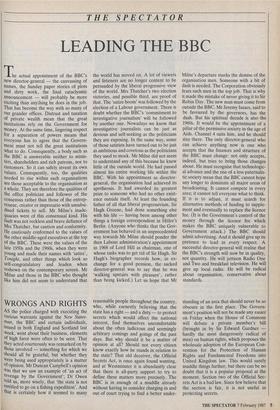THE SPECTATOR
LEADING THE BBC
The actual appointment of the BBC's new director-general — the canvassing of names, the Sunday paper stories of plots and dirty work, the final cataclysmic announcement — will probably be more exciting than anything he does in the job. That has become the way with so many of our grander offices. Distrust and taxation of private wealth mean that the great institutions rely on the Government for money. At the same time, lingering respect for a separation of powers means that everyone has to agree that the Govern- ment must not tell the great institutions what to do. Consequently, a body such as the BBC is answerable neither to minis- ters, shareholders and rich patrons, nor to customers. So it can safely invent its own values. Consequently, too, the qualities needed to rise within such organisations are those acceptable to the organisation as a whole. They are therefore the qualities of the office politician and follower of the consensus rather than those of the entrep- reneur, creator or impresario with unsubsi- dised tickets to sell. Mr Milne's inade- quacies were of this consensual kind. His fault was not reckless and brave defiance of Mrs Thatcher, but caution and conformity. He cautiously conformed to the values of the other middle-aged executives at the top of the BBC. These were the values of the late 1950s and the 1960s, when they were Young and made their names with 'satire', Tonight, and other things which look so self-congratulatory and leaden when reshown on the contemporary screen. Mr Milne and those in the BBC who thought like him did not seem to understand that the world has moved on. A lot of viewers and listeners are no longer content to be persuaded by the liberal progressive view of the world. Mrs Thatcher's two election victories, and possible third, are proof of that. The 'satire boom' was followed by the election of a Labour government. There is doubt whether the BBC's 'commitment to investigative journalism' will be followed by another one. Nowadays we know that investigative journalists can be just as devious and self-seeking as the politicians they are exposing. In the same way, some of those satirists have turned out to be just as ambitious and covetous as the politicians they used to mock. Mr Milne did not seem to understand any of this because he knew little of the outside world. He had passed almost his entire working life within the BBC. With his appointment as director- general, the organisation had achieved its apotheosis. It had awarded its greatest prize to someone who had no other exist- ence outside itself. At least the founding father of all that liberal progressivism, Sir Hugh Greene, had done something else with his life — having been among other things a foreign correspondent in Hitler's Berlin. (Anyone who thinks that the Gov- ernment has behaved in an unprecedented way towards Mr Milne should ponder the then Labour administration's appointment in 1968 of Lord Hill as chairman, one of whose tasks was to get rid of Sir Hugh. Sir Hugh's biographer records how, in ex- change for a good pension, the sacked director-general was to say that he was `walking upstairs with pleasure', rather than being kicked.) Let us hope that Mr Milne's departure marks the demise of the organisation men. Someone with a bit of dash is needed. The Corporation obviously fears such men in the top job. That is why it made the mistake of never giving it to Sir Robin Day. The new man must come from outside the BBC. Mr Jeremy Isaacs, said to be favoured by the governors, has the dash. But his spiritual decade is also the 1960s. It would be the appointment of a pillar of the permissive society in the age of Aids. Channel 4 suits him, and he should stay there. The only director-general who can achieve anything now is one who accepts that the finances and structure of the BBC must change: not only accepts, indeed, but tries to bring those changes about. He must recognise that technologic- al advance and the rise of a less paternalis- tic society mean that the BBC cannot hope any longer to dominate all major areas of broadcasting. It cannot compete in every area; it cannot tell everyone what to think. If it is to adjust, it must search for alternative methods of funding to supple- ment and eventually to replace the licence fee. (It is the Government's control of the money through the licence fee which makes the BBC uniquely vulnerable to Government attack.) The BBC should admit advertising. And it should give up its pretence to lead in every respect. A successful director-general will realise that the BBC's strength will now be in quality, not quantity. He will jettison Radio One and Two and breakfast television. He will give up local radio. He will be radical about organisation, conservative about standards.


















































 Previous page
Previous page